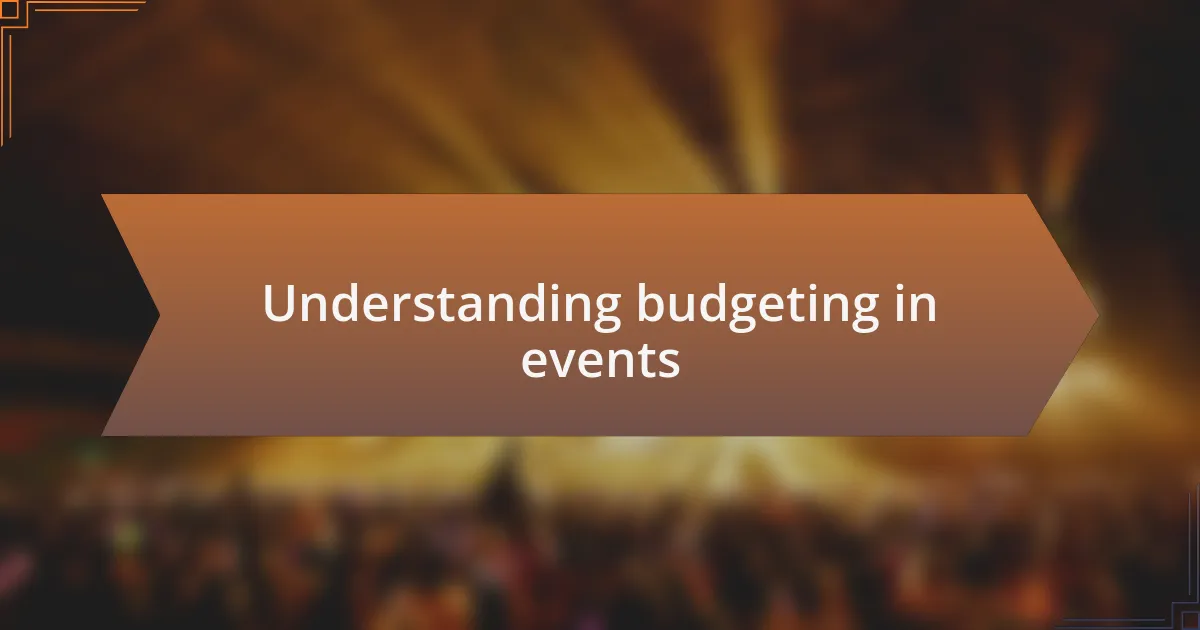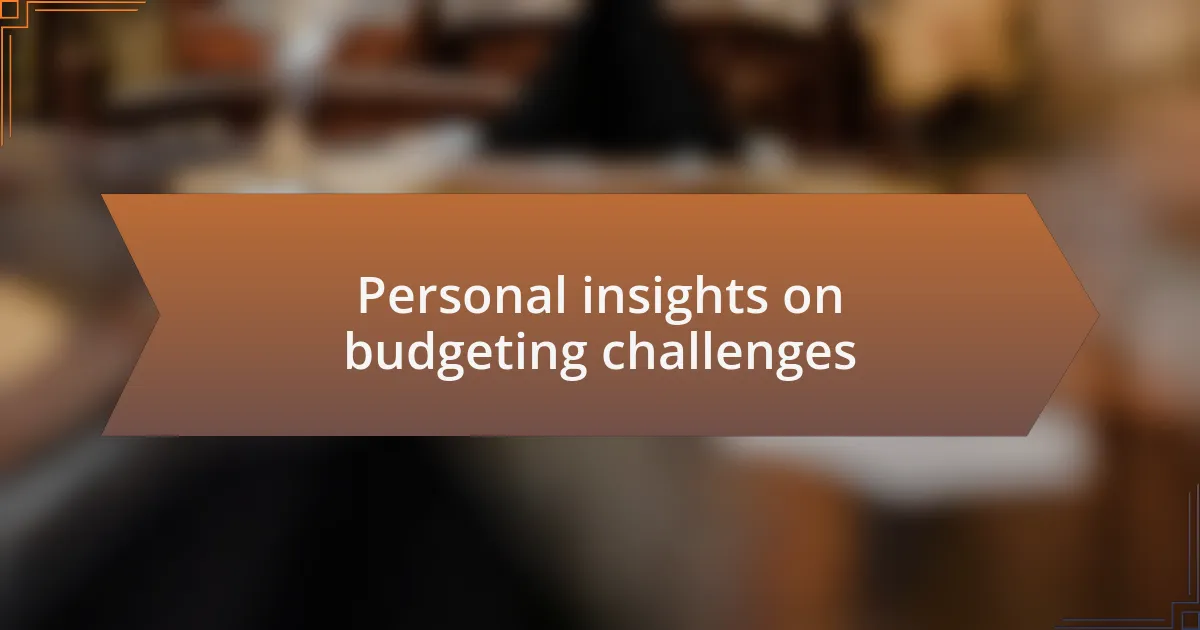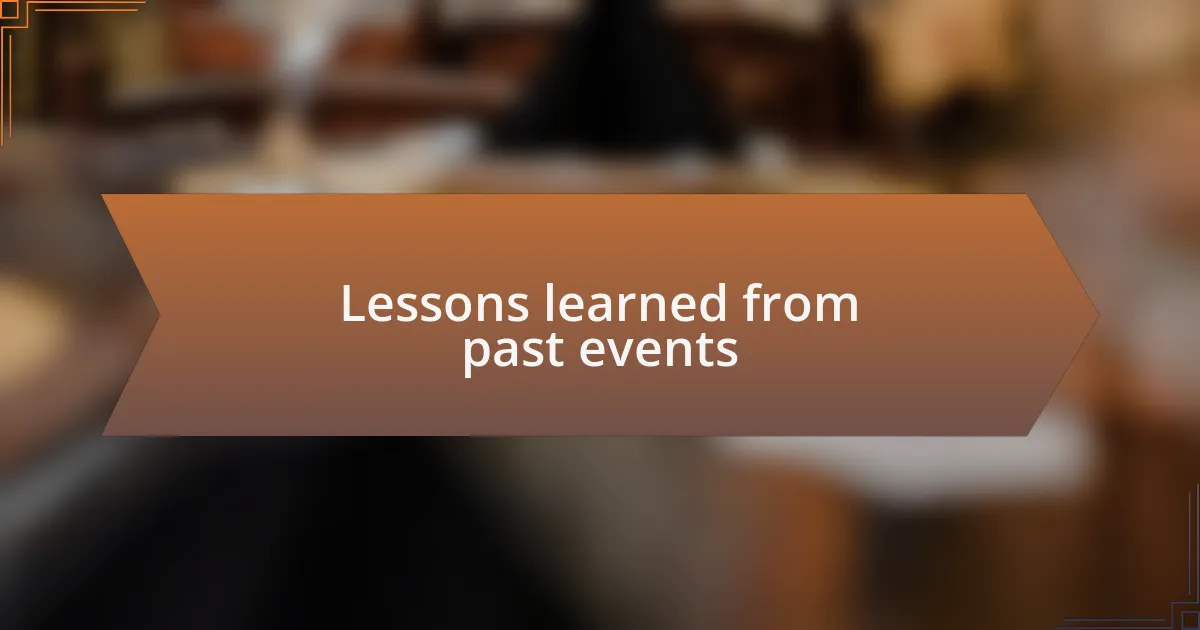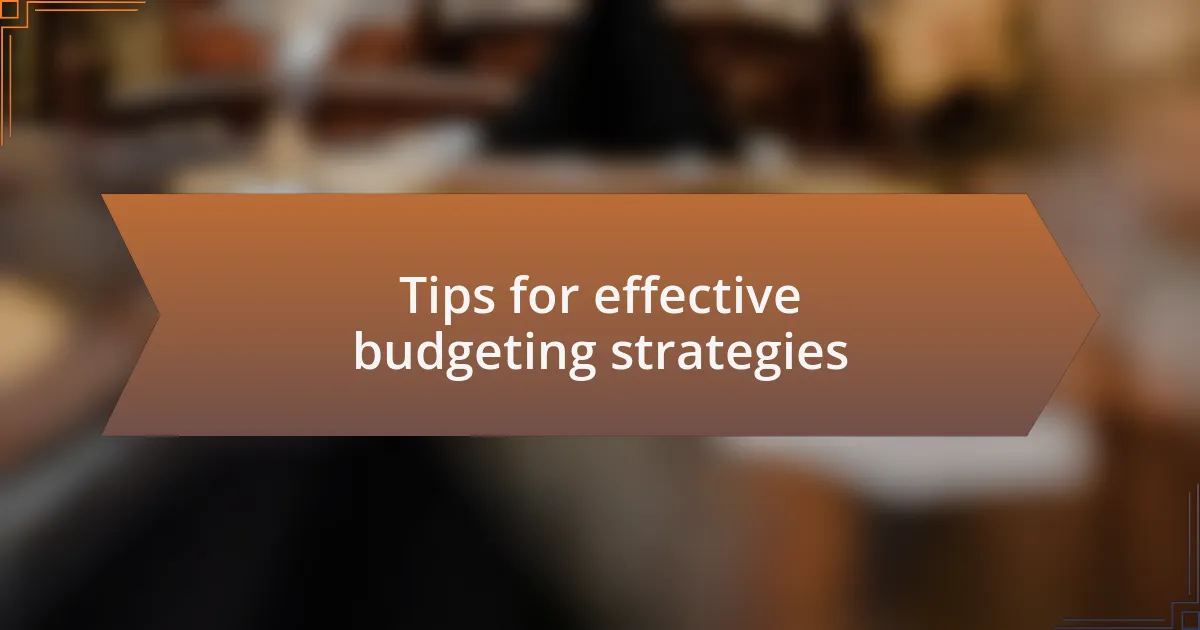Key takeaways:
- Establishing a contingency fund is vital for unexpectedly high costs during events.
- Monitoring expenses in real-time prevents budget surprises and enhances financial control.
- Prioritizing essential expenditures over non-essentials helps in creating a more impactful event.
- Engaging stakeholders fosters collaboration and can reveal innovative cost-saving strategies.

Understanding budgeting in events
Budgeting for events often feels like piecing together a puzzle, where each piece represents a different expense. I remember my first event — I underestimated costs and ended up scrambling at the last minute. It taught me that a well-structured budget not only keeps finances in check but also reduces stress and enhances the overall planning experience.
When I dive into an event budget, I always ask myself, “What are the non-negotiables?” For instance, securing a reputable venue can be costly, but it sets the stage for the entire event’s success. I’ve learned that prioritizing essential elements before allocating funds to less critical areas can lead to a more streamlined and impactful event.
Understanding the ebb and flow of budgeting helped me appreciate the intricate dance between creativity and fiscal responsibility. Watching an idea come to life within financial constraints can be incredibly rewarding. It’s exhilarating to make choices that align with your vision while being mindful of what truly matters, turning budgeting into an art form rather than a chore.

Personal insights on budgeting challenges
When I first started planning events, I often overlooked the smaller, seemingly insignificant expenses. I remember budgeting for a conference and completely forgetting about the costs of decor and promotional materials. That oversight not only strained my finances but also made me question my attention to detail. It really hit home how every little line item matters; budgeting is like a chain where one weak link can impact the entire event’s outcome.
One challenge that often catches new event planners off guard is the cost of last-minute changes. I once decided to add a keynote speaker just a few weeks before the event, thinking it would elevate the experience. Unfortunately, this decision led to higher expenses due to rushed contracts and additional logistics. Reflecting on this, I learned the importance of sticking to the original plan unless absolutely necessary. Have you ever faced a similar situation where impulsive decisions changed your budget? It’s a tough lesson that taught me the value of sticking to what works.
I also find that dealing with vendor negotiations can be a significant pressure point. I vividly recall a time when I felt completely out of my depth negotiating rates with catering services. The stress of trying to balance quality with cost almost made me abandon my vision. It was a learning curve that cemented the notion that preparation and research are key. Knowing what questions to ask and being confident can empower you in those conversations, making the budgeting process less intimidating.

Lessons learned from past events
One of the most significant lessons I learned from past events is the need to establish a contingency fund. I vividly recall an occasion when unexpected weather forced us to change our outdoor setup to an indoor venue, and that shift came with hefty costs. This experience underscored the reality that unforeseen circumstances can arise at any moment, and having a financial cushion can ease the burden of such surprises. Have you ever scrambled to find funds at the last minute? It’s an uncomfortable position to be in, and preparing for the unexpected can save not just money, but also peace of mind.
Budgeting for events also taught me the critical importance of monitoring expenses in real-time. During one event, I was so focused on the bigger picture that I neglected to track smaller expenditures as they came in. By the time the event concluded, I was in for a rude awakening with my final bill. It’s a moment I still think about – the anxiety stirred by those unchecked expenses. Have you ever found yourself in a similar situation where the total came as a shock? This taught me that staying engaged with the budget throughout the planning process can help maintain control and ensure that financial expectations are met.
Over time, I’ve come to appreciate the value of detailed budgeting templates. There was an instance when I juggled multiple events, and a well-organized template was my saving grace. It allowed me to compare costs, allocate resources efficiently, and be more strategic about spending. How often do you find yourself lost in spreadsheets or unsure about where funds were allocated? Streamlining the budgeting process with such tools can lead to more clear insights and better event outcomes, preventing the chaos that often happens when finance management isn’t prioritized.

Tips for effective budgeting strategies
Staying flexible with your budget is crucial for successful event management. I learned this firsthand when an unexpected venue change required additional lighting and sound equipment, driving up costs. I remember staring at the final bill, realizing I had not allocated enough for those adjustments. This experience taught me that budgeting isn’t a one-time task; it requires ongoing adjustments as circumstances evolve. Have you ever had to redirect funds on the fly? Embracing flexibility can transform stressful moments into manageable ones.
Another key strategy is prioritizing essential expenditures. When planning a multi-day conference, I was tempted to splurge on lavish decorations that ultimately didn’t align with attendee needs. I came to realize that investing in comfort, quality speakers, and engaging activities created a more memorable experience than any extravagant decor could. Have you ever overspent on something that seemed important but didn’t leave a lasting impact? By focusing on what truly matters, you ensure that your budget works for you and enhances the value of the event.
Finally, regularly engaging with stakeholders can provide invaluable insights for effective budgeting. I’ve noticed that involving team members in financial discussions not only fosters transparency but also generates innovative ideas on cost-saving measures. There was a time my team suggested a local vendor, which not only reduced costs but also supported the community. Have you tapped into the wisdom of your team when planning budgets? Collaboration can uncover hidden resources and enhance your overall budgeting strategy.